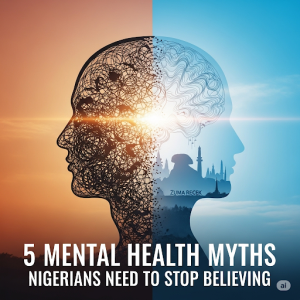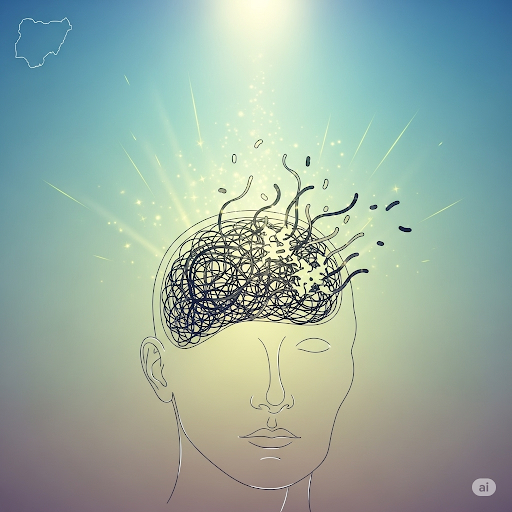Though the conversation around mental health is getting louder in Nigeria, it is still in the shadow of misunderstanding and stigma. People have developed harmful myths and stereotypes due to a lack of accurate information about mental health, illness, and services. The first step in breaking the silence is altering the narrative.
In this article, we debunk five of the most common myths about mental health in Nigeria.
Myth 1: Mental Illness is a Spiritual or Religious Problem
This is one of the strongest beliefs, and yet it often results in people pursuing a spiritual resolution rather than getting professional help.
The Fact: Faith can certainly empower and give strength, but mental illnesses are recognized medical conditions. Through the complexity of genetic influences, brain chemistry, psychological trauma, and environmental stress, mental illness can develop. Just like you wouldn’t pray away a physical illness without receiving medical care, you should not attempt to do that for a mental illness. Therapists and psychiatrists are trained to use evidence-based interventions, like therapy and medications, to treat the actual causes of the respective conditions.
Myth 2: Only ‘Mad’ People Have Mental Health Issues
The overwhelming majority of the Nigerian media and pop culture tends to depict mental health problems as black or white i.e. If you aren’t totally losing control, you’re fine we have no problem.
The Reality: Mental health is a spectrum and we all have it, much like physical health, and it can wax and wane through life. Conditions such as anxiety, depression and stress are very common, and they don’t have to mean that we need to be totally unhinged. They can show up in sleepless nights, ongoing sadness, being moody, and a lack of motivation. Once we acknowledge and understand that mental health is something we all share, we’ll start to care for it, the same way we care for physical health.

Myth 3: Talking About Your Problems is a Sign of Weakness
Throughout many cultures, including our own, we espouse the notion of resilience and strength. This is often convert into the act of “suffering in silence.”
The Truth: The exact opposite of that is true. Asking for help and talking about what is bothering you is the ultimate demonstration of courage and strength. It is the first step to engaging in proactive behaviour to change your well being. Therapy creates an objective, confidential space to share about yourself without judgement. A therapist has training to listen and provide you with tools, to help you engage with challenges, empowering you rather than belittling you.
Myth 4: Mental Health Issues Are Just a Foreign Concept
It is not uncommon to hear the words “mental health problems” described as a “white person’s disease” or hear that Nigerians are too resilient to have mental health problems.
The Truth: Mental health problems do not discriminate based on race, nationality, or region. The conditions related to poverty, unemployment, insecurity, and social inequality in Nigeria present enormous stresses, all of which contribute to the development and the worsening of mental health conditions. Millions of Nigerians have mental health problems such as depression, anxiety, and PTSD. Mental health issues do not care about a person’s historical legacy or the resilience of their battleground – mental health problems will affect anyone regardless of their socio-economic background.
Myth 5: You Can’t Get Help Here in Nigeria
The first misconception that “there aren’t any qualified mental health professionals or resources in Nigeria” makes many believe receiving help is just not an option.
The reality is, the resources may be limited in some areas, but there are a number of people doing professional and dedicated work as mental health practitioners in Nigeria, including psychiatrists, clinical psychologists and therapists. There are also many organizations and initiatives working hard to provide accessible services to the community. A great way to find a list of mental health professionals as well as support groups that you trust, is to get in touch with local mental health advocates and non-profits.
Takeaway
In challenging these myths, we can ultimately foster a more compassionate and understanding society, and that will allow everyone to feel safe to find the help they deserve.
